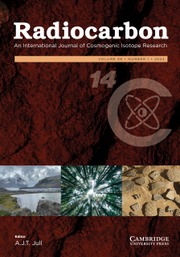No CrossRef data available.
Article contents
MIDDLE HOLOCENE GLACIER ACTIVITY IN THE RUSSIAN ALTAI: EVIDENCE FROM RADIOCARBON AND PALEOTREE DATA IN THE AKKOL VALLEY
Published online by Cambridge University Press: 07 November 2022
Abstract
The available paleosol and paleowood data from the head of the Akkol trough valley, South Chuya range, indicates a climatically driven glacier dynamic in the Russian Altai. Radiocarbon dating of paleosols and paleotree fragments help determine the beginning of the Neoglacial in this high mountain region in the middle of the Holocene. New data limit the advance of the Sofiysky glacier at that time by the front of the Historical moraine. Less so than during the Historical stage (2.3–1.7 cal kBP), glacial activity 5–4 cal kBP is also supported by rapid reforestation. The Akkem moraine in trough valleys of the Russian Altai accumulated prior to the Holocene. The limitations and difficulties of radiocarbon dating of paleosols should be considered when interpreting the dating results.
Keywords
- Type
- Conference Paper
- Information
- Radiocarbon , Volume 64 , Issue 6: 3rd Radiocarbon in the Environment Conference Gliwice, Poland, July 5–9, 2021 , December 2022 , pp. 1545 - 1555
- Copyright
- © The Author(s), 2022. Published by Cambridge University Press for the Arizona Board of Regents on behalf of the University of Arizona
Footnotes
Selected Papers from the 3rd Radiocarbon in the Environment Conference, Gliwice, Poland, 5–9 July 2021



